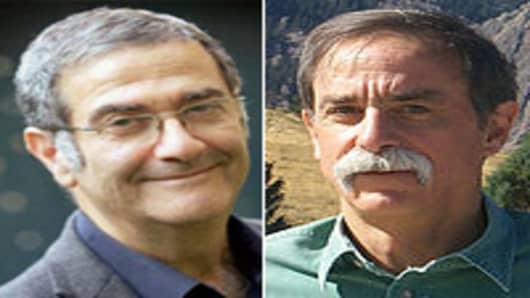Yet the benefits of winning the prize are hardly restricted to the payment itself. The prize often results in better jobs, more research grants, and increased opportunities. Winning “gives them access and invitations to meet people that you couldn’t you meet before,” said Merton. “It makes you more marketable.” The Nobel also leads to further prizes, with their own cash awards.
The Nobel’s economic punch isn’t what it once was, especially for Americans. Citing the financial crisis, the Nobel Foundation has cut the monetary award this year from ten million Swedish kronor to eight million, or about $1.2 million. Since the Reagan tax reforms of the mid-1980s, the United States, the only country to tax the prize, has taken another 40 percent or so off the top. (There is perhaps some justice in this, as the number of U.S. laureates has jumped since 1960, when the National Science Foundation’s funding exploded after the Russians launched Sputnik.)
After each monetary prize is parceled out — only six of the 40 Nobels awarded in the scientific categories in the past decade have gone to one person —any single winner on these shores likely ends up with an amount in the low six figures.
That’s apparently enough to make a difference in the financial lives of the research academics who make the list.
More than one professor has been spotted behind the wheel of a flashy new car soon after winning the award. “Our neighbor’s wife started to wear only bespoke clothes after her husband won,” said a faculty spouse at the University of Chicago, where the number of Nobel laureates among the faculty and alumni is a well-publicized point of pride. “They also gave millions to the university after they both died,” the spouse adds. (Read more: Tennessee City Pays Techies to Relocate)
Indeed, many laureates choose to donate their winnings. Japan's Ryoji Noyori, who won a quarter share of the award in 2001, gave the money to his employer Nagoya University. “Many, many people were involved,” in his research, he told Chemistry World magazine in 2009, “and I received the honor on their behalf.”
Profiting from the prize for some recipients would be unthinkable, or at least unwise politically. The 1989 winner the Dalai Lama gave his money chiefly to the poor. President Obama re-awarded his $1.4 million from the 2009 Nobel Peace Prize to nearly a dozen different charities. (It probably didn't hurt his tax profile, either.)
That doesn't mean that some laureates aren't a tiny bit mercenary about the prize’s financial upside. Many scientists plough the prize money back into their research, a noble act, but also one that allows some money to filter back into their pockets.
Chemistry World also cited the case of Kurt Wüthrich, a Swiss chemist who was facing forced retirement under Swiss law from ETH, the distinguished university in Zurich. After he won a share of the 2002 chemistry prize, his retirement—and possible defection to Scripps Research Institute in California—was debated in Swiss parliament. He was eventually rehired as a full professor. (Read more: Is 70 Too Young to Retire?)
Perhaps nobody has been as pragmatic about the Nobel as the ex-wife of Chicago economist Robert Lucas Jr. In her divorce settlement, Rita Lucas demanded a stipulation that if her husband won the Nobel within seven years, she would get half of the money. In 1995, with less than a year to go in the agreement, Rita Lucas collected.



